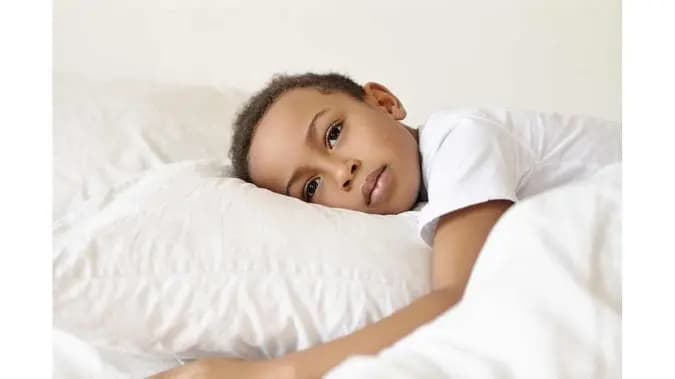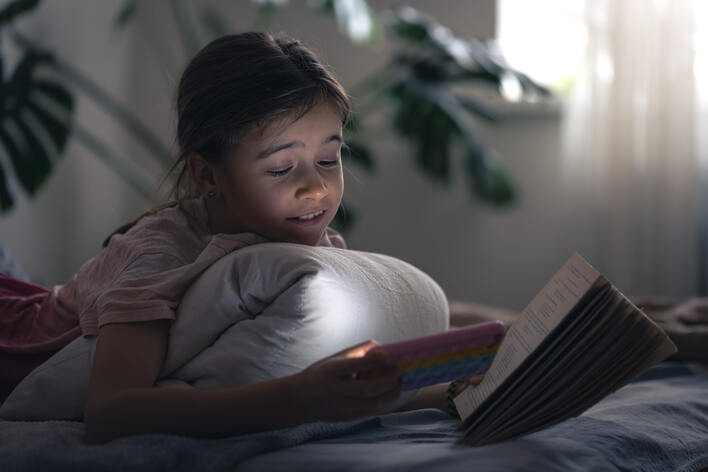The Impact of Sleep on Children's Health
By Harshitha |
Date 06-08-2024

Table of Contents
- How Much Sleep Do Children Need at Different Ages?
- How Does Sleep Impact Children's Growth, Development, and Mood?
- Children’s Sleep Linked to Brain Development
- Research Study
- Symptoms of Sleep Deprivation in Children
- Strategies for creating Healthy Bedtime Routines for Kids
- Prioritizing sleep
- Tips for Healthy Sleep
- Conclusion
- FAQ's
Admissions Open for
The effect of sleep on children's health is not only on rest, but on growth, development, mood, cognitive function, and quality of life. Sleep is thus the fundamental part of the health and well-being of children. It is sad to note that sleep problems have reached the maximum, and children have to face these issues. However, a careful sleep schedule management practice that can be observed and certain medications should be prescribed to them as part of sleep care.
The months can pass by without checking our schedules because we are busy with the various aspects of our lives. The effectiveness of the schedule can also be affected by the disintegration of our traditional night routines and the kids getting extra leisure time. If we neglect sleep, learning, mood, and daily activities all of these can be affected in both mental and physical ways.
Sleep is not noticed and children's sleep needs are often ignored. Sleep deprivation may not be seen as the contributing issue, besides behavioral disturbances, low cognition, and poor overall health.
Parents of children, teenagers, and families may have different opinions about what reasons are responsible for the onset of their behavior, mood, or school performance. However, sleep deprivation might not appear as a probable issue..

How Much Sleep Do Children Need at Different Ages?
Understanding the sleep needs of children at various stages of development is crucial for ensuring they get adequate rest. The amount of sleep required changes as children grow:
-
Newborns (0-3 months): 14-17 hours per day
-
Infants (4-11 months): 12-15 hours per day
-
Toddlers (1-2 years): 11-14 hours per day
-
Preschoolers (3-5 years): 10-13 hours per day
-
School-age children (6-13 years): 9-11 hours per day
-
Teenagers (14-17 years): 8-10 hours per day
Meeting these sleep requirements is essential for supporting physical and mental development, as well as for maintaining overall health.
How Does Sleep Impact Children's Growth, Development, and Mood?
Physical Growth
Sleep plays a vital role in physical growth. During deep sleep, the body releases growth hormone, which is critical for tissue growth and muscle repair. Lack of adequate sleep can disrupt this process, potentially leading to stunted growth and development issues.
Cognitive Development
Sleep is integral to cognitive function and learning. During sleep, the brain processes information, consolidates memories, and strengthens neural connections. Poor sleep can impair concentration, memory, and problem-solving skills, negatively affecting academic performance.
Mood and Emotional Well-being
Adequate sleep is crucial for regulating mood and emotional stability. Sleep-deprived children are more likely to experience irritability, mood swings, and difficulty managing stress. Chronic lack of sleep can contribute to the development of mood disorders such as anxiety and depression.
Children’s Sleep Linked to Brain Development
Sleep is intricately linked to brain development in children. During sleep, the brain undergoes critical processes that support cognitive growth and emotional regulation. These processes include:
Synaptic Pruning
This is the process where the brain eliminates excess neural connections, making the remaining ones more efficient. It is crucial for brain development and occurs primarily during sleep.
Memory Consolidation
Sleep helps solidify learning and memory by transferring information from short-term to long-term memory storage.
Neuroplasticity
Sleep enhances the brain's ability to adapt and reorganize itself, which is essential for learning new skills and behaviors. Disruptions in sleep can interfere with these processes, leading to difficulties in learning, behavior, and emotional control.
Research Study
The researchers identified more than 4,000 ABCD participants aged 9 or 10, who tell their parents they typically sleep nine hours or more a day, and compared this group to a similar number of children whose age is the same with typically sleeping fewer than the recommended nine hours. The research team carefully matched the two groups based on a number of significant factors that could confound the study results. These factors included gender, household income, body mass index, and puberty. Participants were assessed and followed over a two-year period. The results were published July 29, 2022, in the journal Lancet Child & Adolescent Health.
The researchers found that children in the poor sleep group at the beginning of the study had more mental health and behavioral problems than those who were getting enough sleep. These include impulsivity, stress, depression, anxiety, aggressive behavior and thought problems. Sleep deprived children also had impaired cognitive functions, including decision-making, conflict resolution, working memory, and learning. The differences between groups persisted over the two-year follow-up period.
Symptoms of Sleep Deprivation in Children
Identifying sleep deprivation in children is critical for addressing the issue promptly. Symptoms may include:
Daytime Sleepiness: Excessive tiredness during the day, leading to napping or difficulty staying awake.
Behavioral Issues: Increased irritability, mood swings, and difficulty managing emotions.
Cognitive Impairment: Trouble concentrating, forgetfulness, and poor academic performance.
Physical Symptoms: Frequent headaches, stomachaches, and weakened immune response.
Hyperactivity: Some children may exhibit hyperactive behavior as a response to lack of sleep, often misinterpreted as attention deficit hyperactivity disorder (ADHD).
Other Symptoms include
- silliness or giddiness
- Impairment in decision-making, problem-solving and judgment
- Increase in appetite and sugar cravings
- Overemotional
- Poor concentration
- Poor school performance
- Signs of cognitive, memory impairment and forgetting daily tasks
- Tantrums, irritability or aggressive behavior
Strategies for creating Healthy Bedtime Routines for Kids
- It is very important to follow healthy bedtime routines so that your child will have good sleep hygiene and can get enough rest. Here we have given a few strategies.
- Regular Sleep Schedule
- Keeping a consistent sleep schedule, even on weekends, helps regulate your body’s internal clock. Consistency reinforces the sleep-wake cycle.
- Establish a Pre-Sleep Routine
- Doing the same things each night just before bed cues your body to settle down for the night. Relaxing activities such as reading, listening to quiet music, or soaking in a warm bath are best.
- Cut Off Screen Time Before Bed
- The blue light emitted by screens can hinder the production of the sleep hormone melatonin. You should power down your electronic devices at least an hour before you hit the hay.
- Design a sleep-friendly bedroom and a regular bedtime
- Make your child's bedroom conducive to sleep - comfortable, quiet, and dark with a temperature that's not too warm but rather slightly cool.
- Physical Activity
- Regular physical activity can help children fall asleep faster and have better sleep. However, avoid vigorous exercise close to bedtime.
- Monitor Diet and Caffeine Intake - A healthy diet supports good sleep. Avoiding caffeine and heavy meals close to bedtime can prevent sleep disruptions.
Prioritizing sleep
Sleep deprivation is an often overlooked contributor to many performance and behavioral issues in children. Overwork and high levels of studying are highly valued in American society, they are seen as necessary for the future success of children. Children are encouraged and expected to learn more and at a quicker pace therefore being involved in various academic/ extracurricular activities.
Children have become so scheduled that they barely have time for sleep, and the demands for achievement interfere with good sleep. Sleep can be considered lost when one is feeling primed to seize the day.
Tips for Healthy Sleep
In addition to establishing bedtime routines, there are several general tips that can help promote healthy sleep for children:
Teach Relaxation Techniques
Teaching children relaxation techniques such as deep breathing, meditation, or progressive muscle relaxation can help them manage stress and fall asleep more easily.
Promote Positive Sleep Associations
Encouraging positive associations with sleep can help. For instance, associating bedtime with comforting activities can make the process enjoyable and less stressful.
Use a Sleep Diary
Keeping a sleep diary can help identify patterns and potential issues with sleep habits. This can be useful for making adjustments to improve sleep quality.
Seek Professional Help if Needed
If sleep problems persist despite efforts to improve sleep habits, it may be necessary to consult a pediatrician or a sleep specialist. Conditions like sleep apnea or restless leg syndrome require medical intervention.
Educate About the Importance of Sleep
Teaching children about the benefits of sleep can motivate them to prioritize it. Understanding how sleep affects their mood, performance, and health can be a powerful incentive.
Conclusion
The impact of sleep on children's health is profound, affecting their physical growth, cognitive development, and emotional well-being. Sleep deprivation can lead to numerous adverse effects, but by understanding the importance of healthy sleeping habits and implementing effective strategies, parents can help their children achieve the rest they need. Prioritizing sleep is an investment in a child's future, fostering better health, improved academic performance, and a happier, more balanced life.
FAQ's
What happens if children don't get enough sleep?
Insufficient sleep means not getting enough sleep at night, which can cause several problems including decreased brain development, learning problems and more frequent negative emotions. It can also contribute to weight management problems, growth issues and increased frequency of illnesses.
Why do children need enough sleep?
Sleep is especially important for children and young people because it helps with mental, physical, social and emotional development. Sleep helps our brains to remember, memorize and analyze important information. These skills improve performance at school. Sleep can also affect our mood.
What happens to children when they sleep?
Your child's body makes HGH (Human Growth Hormone) while he sleeps, which not only helps his body grow but also repairs muscles, tissue, and bone. This hormone helps your child throughout his life, from triggering those rapid growth spurts in early childhood to facilitating development during puberty and beyond.
What are the effects of bad sleep?
Sleep deficiency is linked to many chronic health problems, including heart disease, kidney disease, high blood pressure, diabetes, stroke, obesity, and depression. Sleep deficiency is also linked to a higher chance of injury in adults, teens, and children.
Liked what you read? Feel free to share this article with your friends and spread the knowledge!
Related Blogs
Food Labels and healthy choices: Methods to educate kids about food labels and promote healthier eating habits.
Healthy snacking and meal planning: Diet planning to fuel your body, maintain energy, and support wellness.
Basic Nutritional Needs for Kids: Essential nutritional needs for kids for healthy growth and development.
CBSE Schools In Popular Cities
- CBSE Schools in Bangalore
- CBSE Schools in Mumbai
- CBSE Schools in Pune
- CBSE Schools in Hyderabad
- CBSE Schools in Chennai
- CBSE Schools in Gurgaon
- CBSE Schools in Kolkata
- CBSE Schools in Indore
- CBSE Schools in Sonipat
- CBSE Schools in Delhi
- CBSE Schools in Rohtak
- CBSE Schools in Bhopal
- CBSE Schools in Aurangabad
- CBSE Schools in Jabalpur
- CBSE Schools in Jaipur
- CBSE Schools in Jodhpur
- CBSE Schools in Nagpur
- CBSE Schools in Ahmednagar
- CBSE School In Tumkur

Call Us to know more about Orchids
Swipe Up

















